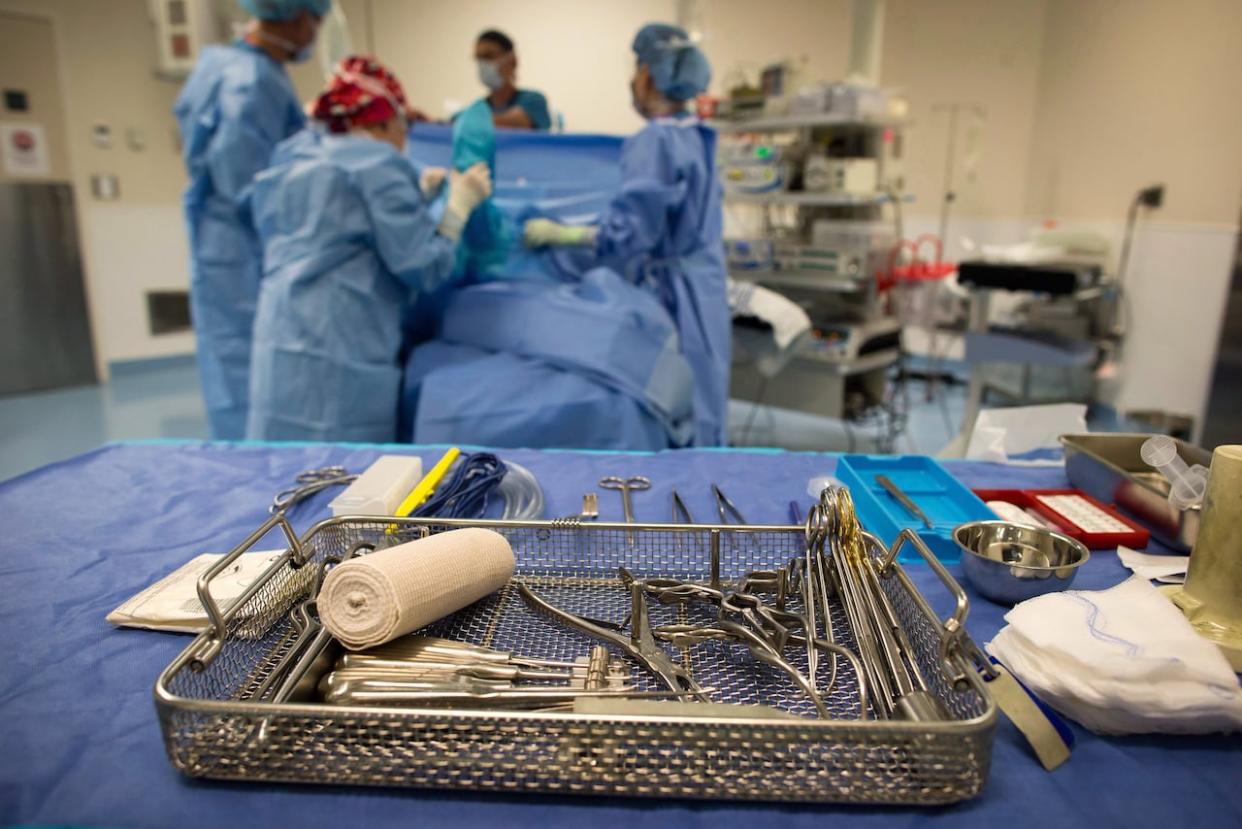Sask. surgery waitlist shrinks as SARM, NDP call for rural health reinforcements

The Saskatchewan government says a record number of surgeries were performed over six months last year as the provincial health-care system closes in on its pre-COVID-19 pandemic waitlist of 25,000 patients.
In a virtual new conference with senior Saskatchewan Health Authority (SHA) officials on Tuesday afternoon, Health Minister Everett Hindley said the province, like other jurisdictions, saw fewer surgeries performed during the pandemic.
"We saw that list grow, and I think it reached a peak of about almost 36,000 people on the waitlist as of November of 2021," he said.
Hindley said that as of Dec. 31, 2023, the waitlist had fallen to more than 27,000.
Cindy Graham, SHA surgical services executive director, said while the province will not reach its goal of reducing the waitlist to 25,000 by the end of March it is getting close.
"We have decreased the overall number of people waiting for surgery in this province by 15 per cent since April 1," Graham said.
The Ministry of Health said as of Dec. 31, 71,850 procedures had been performed, an increase of 6,000 procedures over Dec. 2022.
As of Dec. 31, more than 3,400 patients had been waiting 12 months or more for surgery.
Dennis Kendel, a health-care policy consultant and a retired Saskatchewan physician, said the wait for diagnosis should be factored in.
"There still are extraordinarily long waits for diagnostic procedures which enable you then to access not just surgery but other forms of care," Kendel said.
He said the backlog begins when people wait to find out what their condition is, potentially further delaying surgery.
Kendel said the foundation of the health system needs to be built up to improve access and care for all Saskatchewan patients.
"Primary care is the foundation of the system, and we need to move as quickly as we can to more team-based primary care," he said.
The SHA says the waitlist refers to the time from booking to surgery, and does not account for the first wait between diagnostics and booking.
Dr. Michael Kelly, head of the SHA's provincial department surgery, said the "first" wait is "as important," and that work is being done to improve those times but also to compile and track data in that area.
Opposition, SARM raise health-care concerns
Earlier Wednesday, the Opposition NDP highlighted data released in December by the Canadian Institute of Health Information that showed there are 474 fewer registered nurses in rural Saskatchewan compared with six years ago.
"That's the largest drop in the nursing workforce in all the provinces that were studied, at 21 per cent, since 2018," health critic Vicki Mowat said.
The opposition says the same data shows the province also lost about three dozen physicians to other provinces in 2022.
"Saskatchewan lost a net 35 physicians of all types to other provinces in 2022, the second highest loss only to Alberta, who lost 72 physicians. British Columbia experienced the highest influx of physicians, gaining 112," Mowat said.
"The Sask. Party likes to spin numbers, trying to pass off open positions as hires or only presenting the numbers of the people they've hired, not including anyone who's left or moved. But the real numbers are now in. Doctors and nurses have been leaving rural Saskatchewan communities in droves."
On Wednesday, the Saskatchewan Association of Rural Municipalities issued a news release calling for "immediate action" to address rural health-care concerns.
Specifically, SARM is asking for the reinstatement of the Grow Your Own Nurse Practitioner program that began in 2014.
"It is crucial that we employ or fully utilize all NPs or we will lose this valuable group of professionals to other provinces like Alberta where the job opportunities and wages for NPs are much more attractive," Johanne Rust, nurse practitioner and president of the Saskatchewan Association of Nurse Practitioners, said in a statement.
"Unfortunately, we still have more than 30 underutilized or unemployed NPs in this province. Thirty NPs could immediately provide care to approximately 36,000 patients," Rust said.
SARM president Ray Orb said the government needs to "make it easier" for nurse practitioners to work "where they live."
"The government needs to consider incentives for nurse practitioners in the form of contributions toward relocation expenses and potential bonuses for hard-to-fill positions," Orb said.
Hiring incentives increased
On Tuesday, Hindley was asked about rural health-care concerns in general: "We have made changes in recent months: the establishment of the Saskatchewan Health Recruitment Agency. I would point to the rural physician incentive program."
Hindley said the incentives were increased to $200,000 over a five-year term.
"I think this is significant and should not be understated the recent agreement with the Saskatchewan Medical Association. It's going to help in our rural communities," Hindley said.
Hindley said the Saskatchewan Health Human Resources action plan has helped but the government does face recruitment challenges.
"We need more anesthesiologists in this province and we're trying to fill some vacancies there, but that's competitive right across Canada," he said. "I think the efforts that we're taking as a government and as the SHA have been working, but there's always more that we can be doing."
Dr. Mateen Raazi, provincial head of anesthesiology for the SHA, said while there is a need for anesthesiologists the government has "stabilized" its delivery of those services in rural areas.
"There are many challenges but we are making significant gains," Raazi said.


